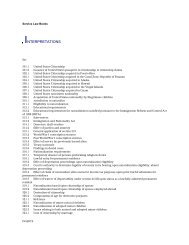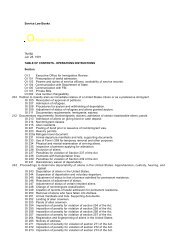You also want an ePaper? Increase the reach of your titles
YUMPU automatically turns print PDFs into web optimized ePapers that Google loves.
<strong>Inspector's</strong> <strong>Field</strong> <strong>Manual</strong><br />
Chapter 16: Special Classes.<br />
References:<br />
INA: Sections 207, 208, 209, 212, 244.<br />
Regulations: 8 CFR 207, 208, 209, 212, 223, 244.<br />
16.1 Parole.<br />
(a) General considerations. Parole authority is exercised by the Attorney General pursuant to section 212(d)(5)<br />
of the Act in a wide variety of situations. Parole is not regarded as an "admission," therefore paroled aliens are<br />
subject to removal proceedings as inadmissible, rather than deportable, aliens. As an inspector, you will<br />
frequently initiate a parole for such things as deferred inspection, referral for removal proceedings, and in other<br />
situations deemed to be in the public interest. You will also process parolees who have been given advance<br />
paroles by other Service officers for a wide range of reasons. Parole may be extended or revoked by a Service<br />
officer at any time.<br />
(b) Processing advance paroles. Advance paroles are issued by Service officers in the U.S. or overseas. Form<br />
I-512, Authorization for Parole of an Alien into the United States, is issued as evidence of advance parole<br />
authorization. An I-512 may be issued for single or multiple entries. The form itself also includes the alien's<br />
biographic data, a glued on or computer imaged ADIT-style photograph, and the facsimile stamp of the district<br />
director for the issuing district. <strong>Manual</strong>ly attached photographs will also have an INS dry seal or INS<br />
maceration die impression. The terms and conditions of parole, including the duration of the parole, are<br />
specified on the form. When an advance authorization is prepared by a consular official rather than an<br />
immigration officer, it will be issued on Department of State letterhead. These letters are commonly referred to<br />
as "transportation letters" or "boarding letters" since they are addressed to the transportation line and absolve<br />
the line of liability for the fine ordinarily incurred when a carrier transports an alien without a required visa.<br />
Ordinarily, processing of paroles is handled in secondary, where there is time to access automated systems to<br />
verify the request. When you encounter an I-512 or boarding letter during the inspection process, examine it<br />
closely. Counterfeit and altered forms have been encountered. Question the applicant concerning the basis of<br />
their parole, to determine if his or her explanation and the basis on which the parole was issued are consistent.<br />
For example, an alien who has not previously been in the U.S. should not have a parole document indicating a<br />
pending adjustment or asylum application as the basis of issuance.<br />
Once you are satisfied that the person is entitled to parole, endorse the I-94 with the parole stamp, indicate in the<br />
appropriate block the basis of parole (e.g." I-512, adjustment applicant"), the date to which paroled (or<br />
indefinite), the date of action, port and your stamp number. Similarly endorse the action block on the I-512 and<br />
the alien's passport. If the I-512 is valid for a single entry, collect it and forward it to the files control office<br />
where the advance parole was issued. If the I-512 is valid for multiple entries, return it to the applicant, after<br />
making a photocopy for forwarding to the issuing office. If the alien parolee is permitted employment and does<br />
not have an employment authorization document advise the applicant about filing procedures. Special handling<br />
procedures described in Chapter 15.11 also apply to holders of Forms I-512 who are nationals of the affected<br />
countries. Handle the I-94 arrival and departure sections in the same manner as other nonimmigrant Forms I-94.<br />
(c) Port-of-entry paroles. Local policy control procedures for authorization of most paroles at ports-of-entry.<br />
Parole is often an appropriate alternative for emergent medical treatment or other similar situations. Unlike a<br />
request for an advance parole, a request for parole at a port of entry requires neither a fee nor an application.<br />
Except for paroles of less than 1 day for border functions or certain NATO activities as described in Chapter<br />
11.2, every parole action requires preparation of Form I-94, endorsed with the parole stamp as described above.<br />
In any case where an alien passenger arriving by air or sea is paroled because he or she lacks the proper visa,<br />
consider institution of fine proceedings against the carrier, as discussed in Chapter 43. In addition, prepare<br />
Form I-160, which is retained at the port-of-entry as a record of the action taken. Institute fine proceedings, when




